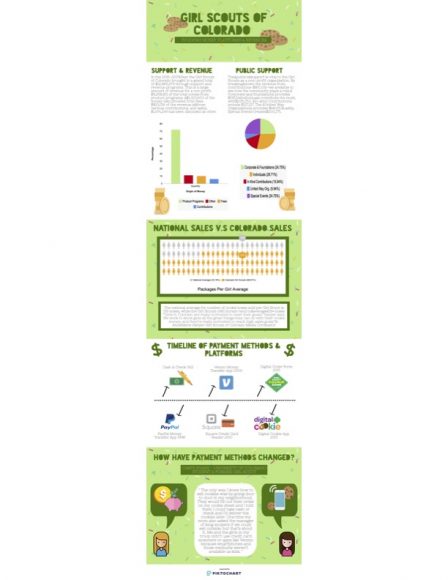
Girl Scouts of America has been selling cookies for over 100 years. But while in 1918 you’d have to buy your cookies with cash, today more and more Girl Scouts are taking credit cards.
Boulder, Colo. is a popular town for Girl Scout cookies, with Scouts taking advantage of the large college student population to sell to. Walk by a booth on campus and you’re likely to see a Girl Scout with a stack of cookies and a credit card reader.
That hasn’t always been the case. Girl Scouts, founded in 1912, began the cookie program in 1917 with cookies baked in the Scouts’ own ovens. For most of the cookie program’s history, you could only buy cookies via cash or check. As society became more reliant on technology, the Girl Scouts had to make a fundamental decision for their future: update their business model to fit in the new technological world, or become irrelevant because of their outdated methods.
More online payment options changed the sales market entirely. Paypal was created in 1998, and 11 years later the Venmo app came online. Venmo allows users to connect their bank account information directly to the app and send money to other users instantly. It is especially popular among young people. A year later, the credit card reader Square came out. Square is a small chip that attaches to smartphones and scans credit cards, using the phone as a digital register.
All of these options, and their various spin-offs, have given Girl Scouts a wide range of ways to sell their goods.
“Me and the girls in my troop didn’t use credit card scanners or apps like Venmo because smartphones and those mediums weren’t available to us kids,” said Carys Evans. Evans is a CU Boulder student and was a Girl Scout throughout elementary school. She said the only way she and her troop members sold cookies was by going door-to-door, and cash or check were their only payment options.
Today’s Girl Scouts are a lot more high-tech. Sophia Pereira and Lucia Nuel, elementary school Girl Scouts, regularly use Venmo and a credit card reader to sell cookies.
“Venmo is easy because it is super quick and then we don’t have to worry about counting out the right amount of money,” said Nuel.
Nuel said older people still use mostly cash or checks, while younger people prefer digital options.
“We sold way more cookies this year than last year but a lot of people chose to write out checks or use money to pay,” Nuel said. “But we did sell to way more young people like college kids because they didn’t have cash or checks, and loved that they could use Venmo and the app.”

While digital options are becoming more popular, they are not officially sanctioned by Girl Scouts of America. AnneMarie Harper, media coordinator for Girl Scouts of Colorado, said that while girls are not discouraged from using card readers or apps, they are not official Girl Scouts sales channels. Instead, Girl Scouts has their own online sales platform, Digital Cookie.
Digital Cookie is an online sales platform option for Scouts to sell cookies through. It functions like an online order form; Scouts can send links to potential customers who can go on, order cookies, pay for cookies and have them shipped directly to their door. The platform was launched in 2014 and this past cookie season over 7,000 Colorado Girl Scouts used Digital Cookie as a payment method.
Harper said Digital Cookie is especially popular with girls in military families, because they can sell to friends and family even if they are overseas or a long ways away. But for most Girl Scouts, their clientele is all in the same town so they prefer to just sell door-to-door or in front of businesses.
“There are shipping charges built into digital cookie; if girls choose to use square or Paypal they assume those fees,” said Harper. “But we pride ourselves on being girl-led and if they think using Venmo or Paypal or square will increase their sales we support their choice in doing that.”
There’s a lack of official statistics, but Nuel’s mother, Renee Nuel, estimated that about 60 to 70 percent of the girls’ customers paid electronically.
“Not many of the customers carry cash with them these days unless they’re older than my age and either don’t know how to use technology or don’t trust it,” Pereira said.
“If I had known about Venmo, I really think that it would have improved my sales as a whole,” said Capri Goldsmith. Goldsmith is a sophomore at the University of Denver and was in Girl Scouts from elementary through high school. Goldsmith said the last year she sold cookies she was able to take credit cards, which was “very beneficial,” because a lot more people had cards than cash.
Harper said that since the Girl Scouts do not keep data on what payment methods Scouts use, she can’t say whether credit card readers have increased Scouts’ sales. However, she said those options have become more popular over the last few years and cookie sales from Colorado Girl Scouts have also increased in the last few years.
There are 23,000 Girl Scouts in Colorado, and the state is one of the top Girl Scout cookie sellers in the country. Harper said that Colorado Girl Scouts sell an average of 314 cookie packages, while the national average is only 156.
“Girls in Colorado are really motivated to meet their goals,” Harper said. “We work to show girls all the great things they can do with their cookie money, and they’re really motivated to reach high sales.”
The Girl Scouts’ overall goal is about much more than just cookie sales and credit card swipes. The organization’s mission statement remains “Girl Scouting builds girls of courage, confidence, and character, who make the world a better place.”
“Girls learn so many important life skills, not just money management but they also learn how to set goals, how to work with a team to achieve those goals, decision making, and business ethics,” Harper said.
“Selling Girl Scout cookies absolutely helped me develop better business and financial skills,” Goldsmith said. “I learned at a very young age how to responsibly deal with money.”
As the world marketplace becomes more and more digital, it makes sense that even small vendors like the Girl Scouts would follow suit. So next time cookie season comes around, don’t be surprised to see Scouts asking “cash or credit?” when selling their cookies.
Contact CU Independent Managing Editor Carina Julig at carina.julig@colorado.edu.
Contact guest writer Hannah Bittrolff at habi7458@colorado.edu.
Contact guest writer Alex Ausmus at alau6607@colorado.edu.



